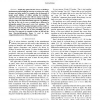1734 search results - page 48 / 347 » What works |
CVPR
2003
IEEE
14 years 10 months ago
2003
IEEE
The body of work on multi-body factorization separates between objects whose motions are independent. In this work we show that in many cases objects moving with different 3D moti...
CHI
2003
ACM
14 years 8 months ago
2003
ACM
We investigated what mobile workers do when they are mobile to achieve their communication goals, using contextual interviews and ethnographically inspired observations in a varie...
ARGMAS
2005
Springer
14 years 1 months ago
2005
Springer
In our previous work on dialogue games for agent interaction, an agent’s set of beliefs (Σ) and an agent’s “commitment store” (CS) — the set of locutions uttered by the ...
CIG
2006
IEEE
14 years 1 months ago
2006
IEEE
— People play games for fun. Yet we are lacking a fundamental understanding of what fun is and how fun works in games and other media. For example, why do thousands of people spe...
GECCO
2010
Springer
13 years 11 months ago
2010
Springer
Shaping functions can be used in multi-task reinforcement learning (RL) to incorporate knowledge from previously experienced tasks to speed up learning on a new task. So far, rese...


